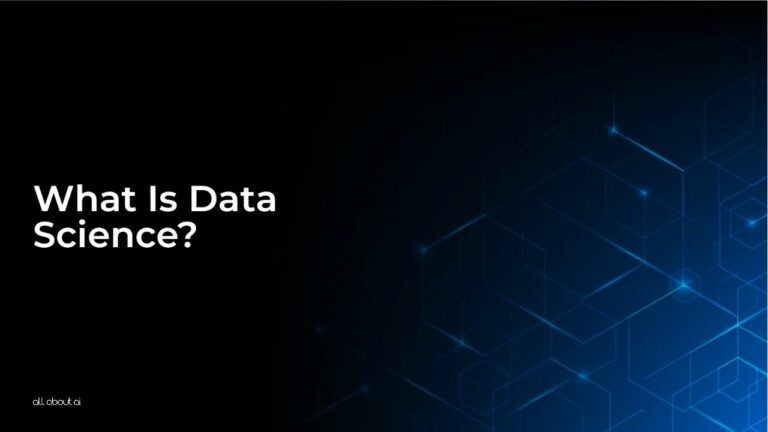What is Data Science? In artificial intelligence (AI), Data Science is the field that uses algorithms, scientific methods, processes, as well as various systems to extract insights and knowledge from data – both structured and unstructured. It involves data collection, cleaning, analysis, and interpretation to inform decision-making and predictive modeling.
Looking to learn more about Data Science and the role it plays in the world of AI? This article by the AI specialists at All About AI covers data science in detail.
Examples of Data Science
Recommendation Systems: Data Science powers recommendation engines by meticulously analyzing user behavior and preferences, allowing them to suggest precisely tailored content or products. This level of personalization not only enhances user engagement but also significantly boosts sales and customer satisfaction.
Fraud Detection: In the financial sector, Data Science stands as the guardian against fraudulent activities. Sophisticated machine learning models scrutinize transaction data in real-time, identifying even the most intricate patterns of suspicious behavior and preventing unauthorized transactions effectively, safeguarding financial institutions and their clients.
Healthcare Predictive Analytics: Data Science is at the forefront of healthcare transformation, predicting disease outbreaks, optimizing treatment plans, and identifying high-risk patients. AI-driven models meticulously analyze patient data, enabling early diagnoses, personalized care recommendations, and ultimately improving healthcare outcomes while reducing costs.
Natural Language Processing (NLP): NLP applications, such as chatbots and language translation, heavily rely on Data Science techniques. These systems meticulously understand and generate human-like text, resulting in efficient and meaningful communication between humans and machines. This revolutionizes customer support, language translation, and content generation, enhancing user experiences across various domains.
Use Cases of Data Science
Autonomous Vehicles: Data Science plays an integral role in self-driving cars by processing vast amounts of data from sensors, cameras, and GPS systems. This meticulous data analysis ensures not only safe navigation but also minimizes the risk of collisions, making autonomous transportation safer and more convenient, and heralding a new era of transportation.
Retail Inventory Management: Retailers leverage Data Science to optimize inventory levels by accurately forecasting demand. By reducing excess inventory costs and preventing stockouts, Data Science enhances overall supply chain efficiency and customer satisfaction, ultimately leading to improved profitability in the fiercely competitive retail industry.
Energy Grid Optimization: The energy sector benefits significantly from Data Science by managing and optimizing energy grids. AI-driven algorithms meticulously analyze consumption patterns, predict energy demand, and make real-time adjustments to supply. This results in increased energy efficiency, reduced wastage, and a more sustainable energy infrastructure, benefiting both consumers and the environment alike.
Marketing Campaigns: Marketers harness the immense power of Data Science to create highly personalized marketing campaigns. These campaigns are meticulously tailored to individual customer preferences and behaviors. Machine learning models analyze vast datasets to identify target audiences, optimize ad placement, and significantly increase conversion rates. This leads to not only more effective marketing strategies but also higher customer engagement and an improved return on investment.
Pros and Cons
Pros
- Data Science empowers data-driven decisions, enhancing accuracy and facilitating informed choices that drive business success.
- Automation driven by Data Science improves efficiency and productivity across various industries, reducing manual workloads and streamlining processes.
- Data Science’s ability to uncover hidden patterns and insights contributes to better decision-making and innovation in diverse fields.
- Personalization, driven by Data Science, improves user experiences, leading to higher customer satisfaction and brand loyalty, ultimately enhancing business profitability.
Cons
- Data privacy and security are critical concerns in Data Science projects, necessitating robust safeguards to protect sensitive information and maintain user trust.
- Resource intensity is a challenge in Data Science initiatives, as they often require substantial computational resources, specialized expertise, and significant investment.
- Model accuracy in Data Science is contingent on the quality and quantity of available data, which can pose difficulties in obtaining and managing data effectively.
- Ethical considerations, such as algorithmic bias and fairness, demand careful attention to ensure equitable and responsible AI and data-driven practices.
FAQs
What is data science with artificial intelligence?
Data science with artificial intelligence combines data analysis techniques and AI algorithms to extract valuable insights, make predictions, and inform decisions from vast and complex datasets.
How does Data Science differ from Machine Learning?
Data Science encompasses a broader range of activities, including data collection, cleaning, visualization, and interpretation, while Machine Learning is a specific subset focused on training algorithms for data-driven predictions and decision-making.
What is the role of Big Data in Data Science?
Big Data plays a crucial role in Data Science by providing massive datasets that enable the discovery of intricate patterns and trends, often unattainable with smaller data, facilitating data-driven decision-making and predictions.
Is data science a part of AI?
Yes, data science is an integral component of AI, as it underpins the training of machine learning models, helps extract meaningful insights, and plays a pivotal role in empowering AI systems to make informed and intelligent decisions.
Key Takeaways
- Data Science is the interdisciplinary field that harnesses data for informed decision-making and predictive modeling.
- It finds applications in recommendation systems, fraud detection, healthcare, NLP, and more.
- Data Science supports autonomous vehicles, inventory management, energy grid optimization, and personalized marketing.
- Pros include data-driven decisions and automation, while cons involve data privacy concerns and resource requirements.
- Key skills for Data Scientists include programming, statistics, and domain knowledge.
Conclusion
Data Science is a pivotal discipline in the era of artificial intelligence. It empowers businesses and industries to make data-driven decisions, enhances user experiences, and drives innovation. By understanding the principles of Data Science, you can unlock its potential to transform various aspects of our lives.
This article aimed to answer the question, ‘what is Data Science.’ Now that you’re familiar with the topic, explore more AI-related concepts and key terms in our comprehensive AI Glossary. Keep learning about the world of AI and expand your horizons!





